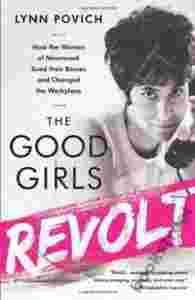|
It was the 1960s--a time of economic boom and
social strife. Young women poured into the workplace,
but the "Help Wanted" ads were segregated by gender and
the "Mad Men" office culture was rife with sexual
stereotyping and discrimination.Lynn Povich was one of
the lucky ones, landing a job at "Newsweek," renowned
for its cutting-edge coverage of civil rights and the
"Swinging Sixties." Nora Ephron, Jane Bryant Quinn,
Ellen Goodman, and Susan Brownmiller all started there
as well. It was a top-notch job--for a girl--at an
exciting place.But it was a dead end. Women researchers
sometimes became reporters, rarely writers, and never
editors. Any aspiring female journalist was told, "If
you want to be a writer, go somewhere else."On March 16,
1970, the day "Newsweek "published a cover story on the
fledgling feminist movement entitled "Women in Revolt,"
forty-six "Newsweek "women charged the magazine with
discrimination in hiring and promotion. It was the first
female class action lawsuit--the first by women
journalists--and it inspired other women in the media to
quickly follow suit.Lynn Povich was one of the
ringleaders. In "The Good Girls Revolt," she evocatively
tells the story of this dramatic turning point through
the lives of several participants. With warmth, humor,
and perspective, she shows how personal experiences and
cultural shifts led a group of well-mannered, largely
apolitical women, raised in the 1940s and 1950s, to
challenge their bosses--and what happened after they
did. For many, filing the suit was a radicalizing act
that empowered them to "find themselves" and fight back.
Others lost their way amid opportunities, pressures,
discouragements, and hostilities they weren't prepared
to navigate. "The Good Girls Revolt "also explores why
changes in the law didn't solve everything. Through the
lives of young female journalists at "Newsweek "today,
Lynn Povich shows what has--and hasn't--changed in the
workplace.
|
|

